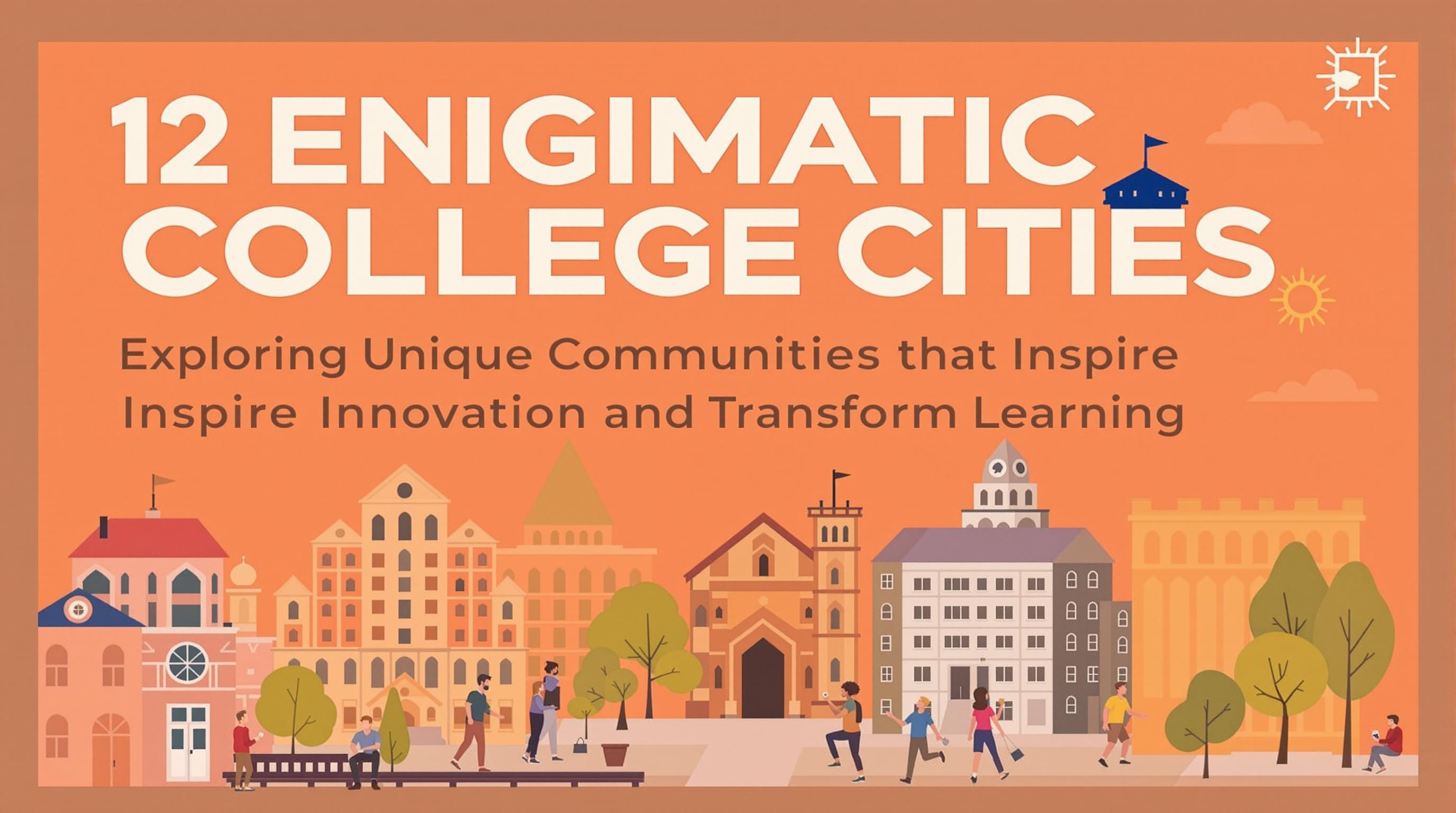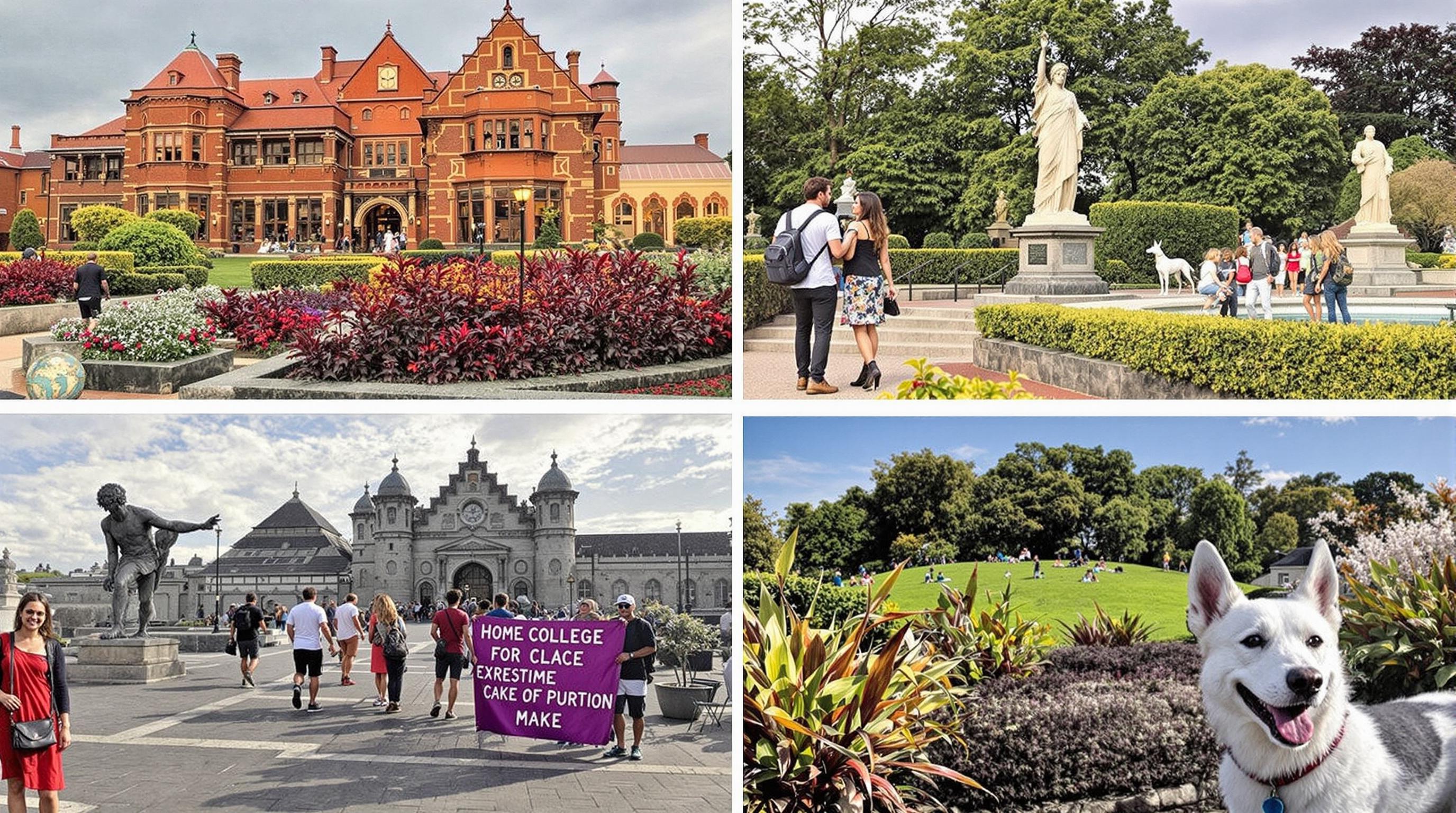Featured Articles
- "10 Unexpected College Destinations Where Learning Fuels Adventure and Cultural Exploration"
- "12 Enigmatic College Cities: Exploring Unique Communities that Inspire Innovation and Transform Learning"
- "15 Surprising College Destinations Where Education Meets Unique Experiences and Lasting Connections"
- Hidden College Gems: Unconventional Study Destinations That Fuel Creativity and Adventure
- "Hidden College Havens: Unveiling Underground Destinations Every Aspiring Student Must Explore"
"Unveiling the Hidden Gems: Offbeat College Towns That Foster Innovation and Unique Learning Experiences"
"Unveiling the Hidden Gems: Offbeat College Towns That Foster Innovation and Unique Learning Experiences"
Discovering offbeat college towns can reveal a treasure trove of innovative ideas and unique educational prospects. From fostering creativity to redefining higher education, these hidden gems provide an enriched learning environment that encourages students to thrive.
Unexpected Corners of Innovation
When you think of college towns, your mind may drift to prominent names like Berkeley, Massachusetts, or Ann Arbor, Michigan. However, many lesser-known towns are crafting remarkable educational experiences that rival the major players. For instance, places like Yellow Springs, Ohio—home to Antioch College—give students a chance to embrace alternative educational philosophies and community-oriented learning.
The Power of Community
More than just academic institutions, offbeat college towns foster a sense of community that enhances the learning experience. In places like Lawrence, Kansas—where the University of Kansas thrives—local residents often engage with students in meaningful ways. This symbiotic relationship lends itself to networking opportunities that can shape future careers.
Consider a study conducted by the American Council on Education, which found that students who engage with community members report a 30% higher satisfaction rate in their college experience. This sense of belonging makes students feel invested, allowing them to contribute actively to both the college and town.
A Blend of Cultures and Ideas
If you’re looking for diversity, head to Gainesville, Florida. The University of Florida isn’t just known for its impressive academic programs; the town itself serves as a vibrant hub of culture. With myriad art festivals, street performances, cuisine options from around the world, and a commitment to inclusivity, it’s an invaluable college experience. The U.S. News & World Report highlights that such cultural diversity in college towns correlates with innovative thinking, suggesting a fertile ground for groundbreaking ideas and entrepreneurship.
Quirky Learning Models and Innovations
Think outside the traditional framework of education. Smaller colleges in unique towns often implement unconventional learning methods. In New Paltz, New York, the State University of New York at New Paltz emphasizes project-based learning, where students undergo real-world projects while collaborating with community businesses. Students leave with not just a degree, but hands-on experience, having integrated themselves into their surroundings.
The Charm of the Unexpected
Now, let's inject some humor into this exploration! Imagine the scene: You're in a small town known for its quirky antique shops and artisan ice cream parlors. To grab a quick bite, you stumble into a café that doubles as a co-working space for artists and tech enthusiasts. While waiting for your soy latte, you overhear an impromptu brainstorming session on app development. By the end of your college term, you may find yourself involved not only in academics but also joining a creative community that inspires you every day. Who knows? You might even end up co-founding the next big start-up from that very café!
Statistics that Speak Volumes
The statistics don't lie: A survey by the National Center for Education Statistics shows that college towns with populations under 50,000 exhibit faster job growth rates—around 12% higher—compared to urban-centric areas. This data might just convince you to consider that “unremarkable” town you're overlooking.
Case Studies: Innovation in Action
Let’s take Kenosha, Wisconsin, as a case study. This city hosts Carthage College and has worked diligently to mesh local innovation with academic rigor. The college has set up design labs and incubators that allow students to work with local entrepreneurs on real-world projects. One standout example is a local arts initiative that transformed a rundown part of Kenosha into a thriving artist community, with college students playing a pivotal role in this revitalization. Such partnerships exemplify how offbeat towns can redefine creativity and education.
The Role of Nature in Education
Don’t overlook the unique geographical benefits of being in a less congested, nature-abundant area. Towns like Asheville, North Carolina, are surrounded by stunning landscapes and national parks. Research has shown that spending time in nature impacts cognitive function positively. Students at UNC Asheville often find inspiration for their studies while hiking nearby trails, blending academic growth with personal well-being.
Breaking Away from the Norm
Sometimes, you just need to break away from traditional teachings. This idea is prevalent at Berea College in Kentucky, where students are required to work while they learn. Berea emphasizes the importance of labor, believing that work and study go hand in hand. It is a refreshing approach that cultivates a sense of responsibility and practical experience unlike any other.
As reported by the college, over 90% of students express that their work experience enriches their academic journey, proving that a little sweat can go a long way toward character building.
Ethical Learning and Global Perspectives
As global citizens, students today are eager to engage with issues that transcend borders. Many small colleges embrace ethical learning modules that expose students to global challenges. Take Menlo College in California, where initiatives focused on ethical leadership are coupled with hands-on learning experiences abroad. Students are not just learning about leadership but are applying these concepts through travel and engagement in diverse cultures, expanding their worldviews considerably.
The Adventure Awaits
Imagine packing your bags and heading to a town where your professor is not only a PhD but also a published author and local legend! Alternatively, picture attending classes in an old, renovated train station—actual stories in every crack and crevice. Quirky settings inspire creativity and laughter, creating memorable experiences that often resonate long after graduation. These less conventional settings make learning not just informative, but downright fun!
The Future of Learning
As we look ahead, many educational institutions in smaller college towns are embracing technology and innovation. Virtual reality classrooms, like the ones introduced at the College of Charleston, provide students a glimpse into both the past and the future. By using cutting-edge technology in a smaller, more intimate town setting, students gain effective learning platforms often missing in larger universities. Statistics from the Global Education Monitoring Report reveal that over 60% of educational institutions integrating tech report improved student engagement and understanding.
Conclusion: The Journey Continues
In conclusion, exploring offbeat college towns reveals the many hidden gems within the educational landscape. The innovative learning experiences, community connections, cultural diversity, and enriched surroundings create an atmosphere ripe for creativity and growth. As you contemplate your next steps in education, consider embarking on a path less traveled—where nature meets innovation and unexpected friendships blossom. Unique college towns may just be the transformative experience you’ve been seeking.




